Ireland–United Kingdom relations
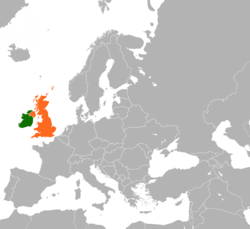 | |
Ireland |
United Kingdom |
|---|---|
| Diplomatic mission | |
| Irish Embassy, London | British Embassy, Dublin |
| Envoy | |
| Ambassador Martin Fraser | Ambassador Paul Johnston |
Since at least 1542, England and later Great Britain and Ireland have been connected politically, reaching a height in 1801 with the creation of the
Irish and British citizens are accorded equivalent reciprocal rights and entitlements (with a small number of minor exceptions) and a Common Travel Area exists between Ireland, United Kingdom, and the Crown Dependencies. The British–Irish Intergovernmental Conference acts as an official forum for co-operation between the Government of Ireland and the Government of the United Kingdom on matters of mutual interest generally, and with respect to Northern Ireland in particular. Two other bodies, the British–Irish Council and the British–Irish Parliamentary Assembly act as a forum for discussion between the executives and assemblies, respectively, of the region, including the devolved regions in the UK and the three Crown dependencies. Co-operation between Northern Ireland and Ireland, including the execution of common policies in certain areas, occurs through the North/South Ministerial Council. In 2014, the UK Prime Minister David Cameron, and the Irish Taoiseach Enda Kenny described the relationship between the two countries as being at 'an all time high'.[1]
Both Ireland and the United Kingdom joined the
The three
Country comparison
| Official Name | Ireland / Éire | United Kingdom of Great Britain and Northern Ireland |
|---|---|---|
| Common Name | Ireland | United Kingdom |
| Flag | 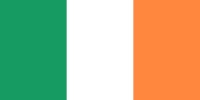
|
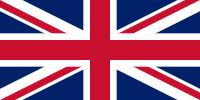
|
| Coat of Arms | 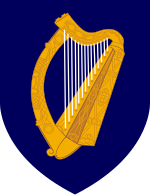
|
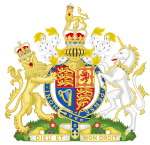
|
| Anthem | Amhrán na bhFiann | God Save the King |
| Capital | Dublin | London |
| Official languages | Irish (36%); English (99%) (Both de facto and de jure) |
English (98%) (de facto) |
| Ethnic groups | 91.7% White (82.2% White Irish, 9.5% Other White), 1.7% Asian, 1.3% Black, 1.5% Other, 2.6% Not Stated, 0.7% Irish Traveller, 0.4% Chinese (2016 Census) | 87% White (81.9% White British), 7% Asian, 3% Black, 2% Mixed Race, 1% Others (2011 Census) |
| Main religions | 78.3% Protestant
1.3% Islam, 6.1% Other Christians and other religions.[4] |
59.3% Christianity, 25.1% Non-religious, 7.2% Unstated, 4.8% Islam, 1.5% Hinduism, 0.8% Sikhism, 0.5% Judaism, 0.4% Buddhism |
| Government | Unitary parliamentary constitutional republic | Unitary parliamentary constitutional monarchy |
| Legislature | Oireachtas | Parliament of the United Kingdom |
| Head of state | Michael D. Higgins, President | Charles III, King |
| Head of government | Leo Varadkar, Taoiseach | Rishi Sunak, Prime Minister |
Population
|
5,148,139 (2022 census) | 65,110,000 (2016 estimate) |
| Area | 70,273 km2 (27,133 sq mi) | 243,610 km2 (94,060 sq mi ) |
Population density
|
67.7/km2 (175.3/sq mi) | 255.6/km2 (662.0/sq mi) |
| Largest city | Dublin – 553,165 (1,904,806 Metro) | London – 8,673,713 (13,879,757 Metro) |
| GDP (PPP) | $102 billion, $124,375 per capita | $2.790 trillion, $42,514 per capita |
| GDP (nominal) | $308 billion, $65,871 per capita | $2.650 trillion, $43,902 per capita |
| Expatriate populations | 503,288 Irish born people live in the UK (2015 UN Estimate)[5] | 250,000 British-born people live in Ireland (2015) |
| Military | Defence Forces (Ireland) | British Armed Forces |
Military expenditures
|
$1.35 billion | $62.7 billion |
History
The expansion of
During the
1600s
In 1641, the Irish were finally able to drive out the English for a short time through a successful rebellion and proclaim the
1782–1918
Although Ireland gained
On 1 January 1801,
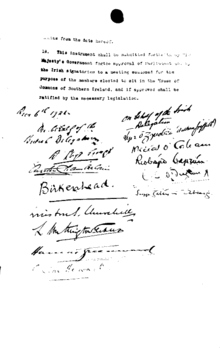
The separate Parliaments of
British oppression led to increasing impoverishment and depopulation of Ireland (the island had still not returned to its 1800 population by the early 21st century). Between 1845 and 1849, Ireland experienced a
In 1873, the
In the 1910s, a political crisis arose in Ireland between supporters of Home Rule and its opponents, consisting of the Protestants in Ulster (Northern Ireland). In 1914, the Government of Ireland Act was finally passed, promising self-government for Ireland, but implementation had to be postponed with the start of World War I. In 1916, the Easter Rising in Ireland saw an attempt to force Irish independence by force. The uprising was violently put down by the British, with Dublin devastated.[16]
Independence 1919–1922
After World War I, violent and constitutional campaigns for
Post-independence conflicts
Boundary commission
The day after the establishment of the
Anglo-Irish Trade War
A further dispute arose in 1930 over the issue of the Irish government's refusal to reimburse the United Kingdom with "land annuities". These annuities were derived from government financed
While the UK was less affected by the Economic War, the Irish economy was virtually crippled by the resulting capital flight. Unemployment was extremely high and the effects of the Great Depression compounded the difficulties. The government urged people to support the confrontation with the UK as a national hardship to be shared by every citizen. Pressures, especially from agricultural producers in Ireland and exporters in the UK, led to an agreement between the two governments in 1938 resolving the dispute.
Many infant industries were established during this "economic war". Almost complete import substitution was achieved in many sectors[19] behind a protective tariff barrier. These industries proved valuable during the war years as they reduced the need for imports. Under the terms of resulting
Articles 2 and 3 and the name Ireland
Ireland adopted a new constitution in 1937. This declared Ireland to be a sovereign, independent state, but did not explicitly declare Ireland to be a republic. However, it did change the name of the state from Irish Free State to Ireland (or Éire in the Irish language). It also contained irredentist claims on Northern Ireland, stating that the "national territory [of the Irish state] consists of the whole island of Ireland" (Article 2). This was measured in some way by Article 3, which stated that, "Pending the re-integration of the national territory ... the laws enacted by the parliament [of Ireland] shall have the like area and extent of application as the laws of Saorstat Éireann" (Saorstát Éireann is the Irish language name of the Irish Free State).
The United Kingdom initially accepted the change in the name to Ireland.
During
As a consequence of the Northern Ireland peace process, Articles 2 and 3 were changed in 1999 formalising shared Irish and British citizenship in Northern Ireland, removing the irredentist claim and making provisions for common "[institutions] with executive powers and functions ... in respect of all or any part of the island."
Abdication crisis and the Republic of Ireland Act
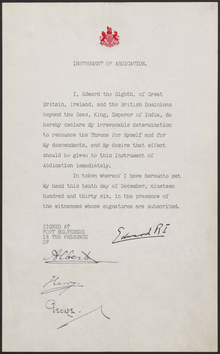
The Irish Free State had been governed, at least until 1936, under a form of constitutional monarchy linked to the United Kingdom. The King had a number of symbolically important duties, including exercising the
In 1937,
During the period from December 1936 to April 1949, it was unclear whether or not the Irish state was a
The state's ambiguous status ended in 1949, when the
One practical implication of explicitly declaring the state to be a republic in 1949 was that it automatically terminated the state's membership of the
The Republic of Ireland Act came into force on 18 April 1949. Ten days later, 28 April 1949, the rules of the Commonwealth of Nations were changed through the London Declaration so that, when India declared itself a republic, it would not have to leave. The prospect of Ireland rejoining the Commonwealth, even today, is still occasionally raised but has never been formally considered by the Irish government.
Toponyms
A minor, through recurring, source of antagonism between Britain and Ireland is the name of the archipelago in which they both are located. Known as the British Isles in Britain, this name is opposed by most in Ireland and its use is objected to by the Irish Government.
A spokesman for the Irish Embassy in London recently said, "The British Isles has a dated ring to it, as if we are still part of the Empire. We are independent, we are not part of Britain, not even in geographical terms. We would discourage its usage [sic].".[22]
No consensus on another name for the islands exists. In practice, the two Governments and the shared institutions of the archipelago avoid use of the term, frequently using the more appropriate term these islands in place of any term.
The Troubles
Political violence broke out in Northern Ireland in 1968 following clashes over a
In the wake of the riots, the Republic of Ireland expressed its concern about the situation. In a televised broadcast, Taoiseach Jack Lynch stated that the Irish Government could "no longer stand by" while hundreds of people were being injured. This was interpreted as a threat of military intervention.[23] While a plan for an Irish invasion of Northern Ireland was rejected by the Government of Ireland, a secret [citation needed] Irish government fund of £100,000 was dedicated to helping refugees from the violence.[citation needed] Some more actively nationalist Irish Ministers were tried in 1970 when it emerged that most of the fund had been spent covertly on buying arms for nationalists.[citation needed]
Angry crowds burned down the
Throughout the conflict, the Republic of Ireland was primarily crucial for the IRA campaign against British troops and loyalist paramilitaries.[a] Irish historian Gearóid Ó Faoleán wrote for The Irish Times that "[t]hroughout the country, republicans were as much a part of their communities as any others. Many were involved in the GAA or other local organisations and their neighbours could, to paraphrase [Irish writer Tim Pat] Coogan, quietly and approvingly mutter about the 'boys' – and then go off without a qualm the next day to vote for a political party aggressively opposed to the IRA."[25] Shannon Airport and Cork and Cobh harbours were used extensively by the IRA for arms importation overseas during the early 1970s aided by sympathetic workers on-site. Most IRA training camps were located in the republic, as did safe houses and arms factories. The vast majority of the finances used in the IRA campaign came from criminal and legitimate activities in the Republic of Ireland rather than overseas sources. Large numbers of improvised explosive devices and firearms were manufactured by IRA members and supporters in Southern Ireland and then transported into Northern Ireland and England for use against targets in these regions. For example, one IRA arms factory near Stannaway Road, Dublin, was producing six firearms a day in 1973. An arms factory in the County Dublin village of Donabate in 1975 was described as "a centre for the manufacture of grenades, rockets and mortars." Gelignite stolen from quarries, farms and construction sites in the Republic was behind the 48,000lbs of explosives detonated in Northern Ireland in the first six months of 1973 alone. IRA training ranged from basic small arms and explosives manufacturing to heavy machine guns, overseen by Southern Irish citizens, including a former member of the Irish Defence Forces.[26][27] Thousands of Irish citizens in the Republic joined the IRA throughout the conflict; for example, the assassination of Louis Mountbatten in August 1979 was carried out by IRA member Thomas McMahon from Monaghan.[28]
An attempt by the two governments to resolve the conflict in Northern Ireland politically in 1972 through the Sunningdale Agreement failed due to opposition by hard-line factions in Northern Ireland. With no resolution to the conflict in sight, the Irish government established the New Ireland Forum in 1984 to look into solutions. While the British UK Prime Minister Margaret Thatcher rejected the forum's proposals, it informed the British government's opinion and it is said to have given the Irish Taoiseach Garret FitzGerald a mandate during the negotiation of the 1985 Anglo-Irish Agreement, which was directed at resolving the conflict.[29][30] The 1992 Downing Street Declaration further consolidated the views of the two Governments and the 1998 Good Friday Agreement eventually formed the basis for peace in the province.
The Irish Department of Foreign Affairs established a "Reconciliation Fund" in 1982 to support organisations whose work tends to improve cross-community or North–South relations.[31] Since 2006, the Minister for Foreign Affairs has hosted an annual "Reconciliation Networking Forum" (sometimes called the "Reconciliation Forum"; not to be confused with the Forum for Peace and Reconciliation) in Dublin to which such groups are invited.[32][33]
Brexit
There is
The people of the UK voted to leave the European Union in a non-binding referendum on 23 June 2016, an act which would effectively make the Republic of Ireland-Northern Ireland border an external EU border.[35] Due to the lack of supporting legislation, all referendums in the UK are not legally binding, which was confirmed by a Supreme Court judge in November 2016.[36] Nevertheless, the UK government chose to proceed with the departure from the European Union. All parties have stated that they want to avoid a hard border in Ireland particularly due to the sensitive nature of the border. The border issue is concerned by a protocol related to the withdrawal agreement, known as the Protocol on Ireland and Northern Ireland.[37]
Good Friday Agreement

| Strand 1 |
|---|
| Strand 2 |
| Strand 3 |
| Additional bodies |
The conflict in Northern Ireland, as well as dividing both Governments, paradoxically also led to increasingly closer co-operation and improved relations between Ireland and the United Kingdom. A 1981 meeting between the two governments established the Anglo-Irish Intergovernmental Council. This was further developed in 1985 under the
The Northern Ireland peace process culminated in the Good Friday Agreement of 1998 that further developed the institutions established under these Anglo-Irish Agreement. New institutions were established interlocking across "strands":
- Strand I: an Assembly and Executive for Northern Ireland based on the D'Hondt system;
- Strand II: a North-South Ministerial Councilto develop co-operation and common policies within the island of Ireland;
- Strand III:
- a British–Irish Council "to promote the harmonious and mutually beneficial development of the totality of relationships among the peoples of these islands"
- a new British–Irish Agreement, replaced the Anglo-Irish Intergovernmental Council and the Anglo-Irish Intergovernmental Conference.
The scope of the British–Irish Intergovernmental Conference is broader that the original Conference, and is intended to "bring together the British and Irish Governments to promote bilateral co-operation at all levels on all matters of mutual interest within the competence of both Governments." The Conference also provides a joint institution for the government of Northern Ireland on non-devolved matters (or all matters when the Northern Ireland Assembly is suspended). However, the United Kingdom retains ultimate sovereignty over Northern Ireland. Representatives from Northern Ireland participate in the Conference when matters relating to Northern Ireland are concerned.
The members of the British–Irish Council (sometimes called the Council of the Isles) are representatives of the Irish and British Governments, the devolved administrations in Northern Ireland, Scotland and Wales, together with representatives of the Isle of Man and the Channel Islands. It meets regularly to discuss matters of mutual interest divided into work areas (such as energy, environment or housing) allocated to individual members to work and report on.
The Anglo-Irish Interparliamentary Body developed independently over the same period, eventually becoming known as the British–Irish Parliamentary Assembly and including members from the devolved administrations of the UK and the Crown Dependencies.
The development of these institutions was supported by acts such the visit of efforts by
Political landscape
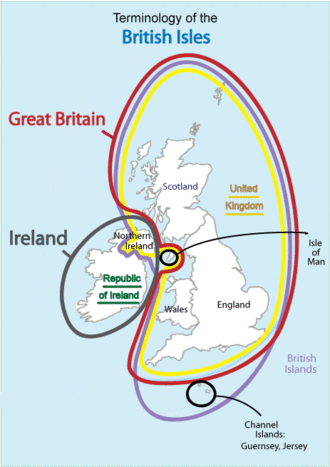
Today, the
There are also three
The devolved administrations of the United Kingdom and the three Crown Dependencies also participate in the shared institutions established under the Good Friday Agreement.
The
Academic perspectives
Several academic perspectives are important in the study and understanding of Ireland–United Kingdom relations. Important strands of scholarship include research on identity, especially
Co-operation
The British–Irish Intergovernmental Conference provides for co-operation between the Government of Ireland and the Government of the United Kingdom on all matters of mutual interest for which they have competence. Meetings take the form of summits between the Prime Minister of the United Kingdom and the Irish Taoiseach, on an "as required" basis. Otherwise, the two governments are represented by the appropriate ministers. In light of Ireland's particular interest in the governance of Northern Ireland, "regular and frequent" meetings co-chaired by the Irish Minister for Foreign Affairs and the UK Secretary of State for Northern Ireland, dealing with non-devolved matters to do with Northern Ireland and non-devolved all-Ireland issues, are required to take place under the establishing treaty.
At these meetings, the Irish government may put forward views and proposals, however sovereignty over Northern Ireland remains with the United Kingdom. In all of the work of the Conference, "All decisions will be by agreement between both Governments [who] will make determined efforts to resolve disagreements between them." The Conference is supported by a standing secretariat located at Belfast, Northern Ireland, dealing with non-devolved matters affecting Northern Ireland.
'All-islands' institutions
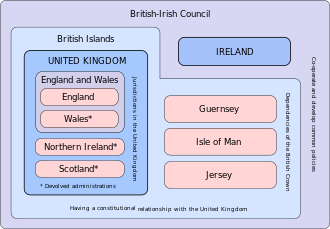
The British–Irish Council (BIC) is an
- the two sovereign governments of Ireland and the United Kingdom;
- the three devolved administrations in Northern Ireland, Scotland and Wales
- the three governments of the .
The Council formally came into being on 2 December 1999. Its stated aim is to "promote the harmonious and mutually beneficial development of the totality of relationships among the peoples of these islands". The BIC has a standing secretariat, located in
While the Council is made up of representatives from the executive of the various administrations in the region, it does not have executive power itself. Instead, its decisions, so far as they exist, are implemented separately by each administration on the basis of consensus. Given this – that the Council has no means to force its member administrations into implementing programmes of action – the Council has been dismissed as a "talking shop" and its current role appears to be one mainly of "information exchange and consultation".[40]
In addition to the Council, the
These institutions have been described as part of a confederal approach to the government of the British–Irish archipelago.[40][41]
All-Ireland institutions

The North/South Ministerial Council (NSMC) coordinates activity and exercises certain governmental functions across the island of Ireland. The Council is responsible for developing and executing policy in at least twelve areas of co-operation, of which:
- at least six are executed separately in each jurisdiction
- at least six are executed by an all-Ireland "implementation body"
Further development of the role and function of the Council are possible "with the specific endorsement of the Northern Ireland Assembly and Oireachtas, subject to the extent of the competences and responsibility of the two Administrations."
The North/South Ministerial Council and the Northern Ireland Assembly are defined in the Good Friday Agreement as being "mutually inter-dependent, and that one cannot successfully function without the other." Participation in the Council is a requisite for the operation of the Northern Ireland Assembly and participation in the Northern Ireland Executive. When devolution in Northern Ireland is suspended, the powers of the Northern Ireland Executive revert to the British–Irish Intergovernmental Conference.
Meetings of the Council take the form of "regular and frequent" sectoral meetings between ministers from the
There is no joint parliamentary forum for the island of Ireland. However, under the Good Friday Agreement, the Oireachtas and Northern Ireland Assembly are asked to consider developing one. The Agreement also contains a suggestion for the creation of a consultative forum composed of members of
Inter-regional relationships
Independent of the direct involvement of Government of the United Kingdom, the devolved administrations of the mainland United Kingdom and the Crown dependencies also have relationships and with Ireland.
For example, the Irish and Welsh governments collaborate on various economic development projects through the Ireland Wales Programme, under the
Common Travel Area

Ireland is the only member state in the European Union not obliged to join the Schengen free-travel area (The United Kingdom also had an opt out from joining prior to its withdrawal from the bloc in 2020). Instead, a Common Travel Area exists between the two states and the Crown Dependencies (which were never part of the EU, thus never obliged to join Schengen).
The Common Travel Areas is not founded on any formal agreement between Ireland and the United Kingdom and is not provided for in legislation. Instead, it is an informal arrangement between the states. When the Schengen Area was incorporated into the European Union through the 1992
The UK's previous reluctance to join the Schengen Area when it was a member state, was mainly centred around concerns over loss of independent border controls, is usually cited as the reason for not joining. Britain argued that, for an island, frontier controls are a better and less intrusive way to prevent illegal immigration than other measures, such as identity cards, residence permits, and registration with the police. Consequent difficulties for Ireland, given its location and shared border with the UK (at which border points would have to be set up), would then make it very difficult for Ireland to join without the UK.
Except for a period during and in the years after World War II, neither Ireland nor the UK have placed restrictions on travel between each other for citizens resident in each others states since Irish independence. Even during wartime, when Ireland remained neutral and the UK was a belligerent during World War II, the only significant restrictions on travel between the states were an Irish prohibition on the wearing of military uniforms by British citizens when in Irish territory and the instatement of passport controls between Great Britain and the island of Ireland. When Ireland declared itself a republic in 1949, thus making it impossible at the time to remain in the
Prior to post-World War II, both states mutually recognised each other's entry visas for foreigners. However, in 1952 changes to UK law rescinded this arrangement. In 2011, the first public agreement between the British and Irish governments concerning the maintenance of the Common Travel Area (CTA) was published.[44]
The agreement, which is non-binding, envisions increased co-ordination between Irish and British immigration arrangements and that, from July 2011 Ireland would recognise UK short terms visas on an 18-month pilot basis for nationals of 16 countries. The agreement also mooted the possibility of "Common Travel Area visit visa" including the possibility of a pilot project.
The CTA applies only to Irish and British citizens. As such, residents of either state (or any of the Crown Dependencies) who do not hold one of those nationalities do not have an automatic right to enter Ireland from the UK, or vice versa, including over the land border.[45] As a result of this, there was some controversy when the British government announced an electronic authorisation system for tourists to the UK, which would have meant non-citizen Irish residents, including EU nationals, would need to apply for an authorisation to cross the land border. This would include many who live near the border and cross regularly for leisure trips. In March 2024, the British government updated guidance to exempt residents of the republic from the scheme.[46]
There are no special arrangements for travel between the Common Travel Area and the Schengen Area and a
Citizenship and citizens rights

As a
Starting from the basis of common citizenship, the two states to this day provide reciprocal recognition to each others' citizens. British and Irish citizens can avail themselves of public services (for example, health care and
Northern Ireland occupies a unique location in the citizenship of the islands, with Northern Ireland people being recognised under the Good Friday Agreement as (in general terms) simultaneously British and/or Irish citizens according to their choice.
The interaction of overlapping citizens rights and laws has led to some cases of exploitation of loopholes to avoid the intention of the law. For example, the
Energy
A
In 2004, a natural gas interconnection agreement was signed between the United Kingdom and Ireland, linking Ireland with Scotland via the Isle of Man.[49]
In 2011, the members of the British–Irish Council agreed an "All Islands Approach (AIA)" to electricity grid infrastructure and have launched a programme of joint work examining renewable energy trading as well as interconnection and market integration.[50]
Shared bodies
The United Kingdom and Ireland share a number of civic bodies such as the Royal National Lifeboat Institution, that provides sea-rescue across Britain and Ireland.
The three lighthouse authorities in the archipelago (the Northern Lighthouse Board, Trinity House Lighthouse Service and the Commissioners of Irish Lights) are funded by a single General Lighthouse Fund managed by the UK Department for Transport and paid for by light dues levied on ships calling at British and Irish ports. While this broad arrangement will continue, the total cost of the Commissioners of Irish Lights' work in Ireland (not Northern Ireland) will be met from income raised domestically as from 2015—16.[51]
Military cooperation
The Republic of Ireland and the United Kingdom normalised military cooperation with the signing of a
The Memorandum of Understanding (MOU) provides a framework for developing and furthering bilateral co-operation and relations between the Department of Defence and the UK Ministry of Defence. The MOU takes into account matters such as military forces training; exercises and military education; exchange of views on EU Common Security and Defence Policy; potential for joint contributions to UN Crisis Management Operations; joint procurement initiatives; pooling and sharing resources; general sharing of reform in defence services; potential for staff exchanges; sharing of information, and joint contribution to Security Sector Reform and capacity building in crisis locations. It envisages cooperation and exchanges involving both civil and military personnel. The signing of the MoU places already existing co-operation arrangements in the Defence area between Ireland and the UK on a more formal and transparent footing, while fully respecting the differing policy positions and security arrangements of both States.
To date, I have not been requested to appear before the Committee on Justice, Defence and Equality to discuss the Agreement. However, I would welcome the opportunity to brief the Committee should the opportunity arise.
Dáil approval was not required for the Memorandum of Understanding. However, in the interests of transparency and good administrative practices, the Document has been laid before Dáil Éireann by lodging it to the Dáil Library on 21 January 2015.
— Simon Coveney, "Dáil Written Answers Nos. 354-370"[52]
Historically, Ireland has maintained a policy of strict military neutrality since the foundation of the state. As a result, Ireland has never joined the UK as an active ally, during any modern conflict.[citation needed]
Political movements
This section needs expansion. You can help by adding to it. (May 2012) |
An important political movement in several countries in the Isles is
The converse of unionism,
Several Irish parties are organised on both sides of the
Pan-Celticism is also a movement which is present in several countries which have a Celtic heritage.
Immigration and emigration
This section needs expansion. You can help by adding to it. (May 2012) |
As of 2013, the Britons represent the largest immigrant minority of European origin in the Republic of Ireland.
Culture
The United Kingdom and Ireland have separate media, although British television, newspapers and magazines are widely available in Ireland,
Ireland and the United Kingdom have agreed to a deal on the digital broadcast of
Some cultural events are organised for the island group as a whole. For example, the
The
was originally played between a United States team and a team representing Great Britain and Ireland. From 1979 onwards this was expanded to include the whole of Europe.In 2012, the
Many of the countries and regions of the isles, especially
Economic relations
Due to the linguistic, cultural and legal (both as common law countries) similarities between the UK and Ireland, many businesses in both countries have operations in each other country. Both countries have each other as their biggest business partner, and both in the same trade organisations include the European Union and World Trade Organization.
Examples of notable British companies that have an Irish operations come as diverse as the supermarket chain
Due to the closeness, some businesses often treat both countries of trade, finance and marketing as a single unit as quoting for "UK and Ireland" rather than two separate countries.
Trade agreements
After both nations' bids to join the European Economic Community were rejected, Ireland and the UK signed the Ireland–UK Free Trade Area agreement on 19 December 1965.[57] The bilateral free trade area was legally in force from 1 July 1966 until 1 January 1973.[58] Both countries joined the European Economic Community on 1 January 1973.[59][60] The European Economic Community was incorporated into the European Union on the 1 November 1993.[61]
Following the result of the Brexit referendum, the UK invoked Article 50 in March 2017.[62][63] The UK officially withdrew from the EU on the 1 January 2021. Trade between the United Kingdom and Ireland is governed by the EU–UK Trade and Cooperation Agreement since 1 January 2021.[64][65]
Resident diplomatic missions
- Ireland has an embassy in London and consulates-general in Cardiff, Edinburgh and Manchester.[66]
- United Kingdom has an embassy in Dublin.[67]
-
Embassy of Ireland in London
-
Embassy of the United Kingdom in Dublin
See also
- Anglo-Irish
- Foreign relations of Ireland
- Foreign relations of the United Kingdom
- Ireland–United Kingdom border
- Irish community in Britain
- Ireland–NATO relations
- List of ambassadors of the United Kingdom to Ireland
- United Kingdom–European Union relations
Notes
- ^ "The sheer level of sympathy and support that existed for militant republicanism [in the Republic of Ireland] demonstrates that the longevity of the ‘Troubles’ was due in large part to this widespread tolerance and aid. Former IRA volunteers attest to in interviews and previously unpublished accounts of training camps in the Republic. Juried courts for IRA suspects were phased out as both juries and judges were regularly acquitting republicans in cases of blatant IRA activity."[24]
References
- ^ "Anglo-Irish relations 'at peak'". Belfasttelegraph. Archived from the original on 21 July 2019. Retrieved 11 January 2018.
- ^ "Guidance for us Online". London: Foreign and Commonwealth Office. 2012. Archived from the original on 3 October 2012. Retrieved 30 May 2012.
The database includes the names of the Overseas Territories and the Crown Dependencies of the United Kingdom which have been specifically included in the UK's treaty obligations, either at the time of ratification or accession, or subsequently.
- ISBN 978-0521690294,
The United Kingdom and Irish Governments agreed in 1999 on the establishment of a North-South Ministerial Council in accordance with Strand Two of the Belfast Agreement. (See Agreement on the North/South Ministerial Council, CM 4708/2000.)
...
The Irish and British Governments also agreed in 1999 on the establishment of a British–Irish Council, in accordance with Strand Three of the Belfast Agreement and as a concession to Unionist concerns about an institutionalised participation of the Republic of Ireland in the affairs of the Province. (See Cm 4710/2000.) This Council comprises representatives of the Irish and British Governments, of the devolved administrations in Northern Ireland, Scotland, and Wales, and of the three Crown dependencies of Jersey, Guernsey and the Isle of Man. - ^ Smyth, Declan (12 October 2017). "Profile 8 – Irish Travellers Ethnicity and Religion" (Press release). CSO.ie. Central Statistics Office. Archived from the original on 16 November 2020. Retrieved 5 January 2018.
- ^ "Trends in International Migrant Stock: Migrants by Destination and Origin (United Nations database, POP/DB/MIG/Stock/Rev.2015)" (XLS). United Nations, Department of Economic and Social Affairs. 2015. Archived from the original on 13 April 2016. Retrieved 2 January 2017.
- ^ Ortiz, Roxanne-Dunbar. An Indigenous Peoples History of the United States. p. 37. Retrieved 3 November 2022.
- ^ a b "Anglo-Irish relations 1690-1914". Northern Ireland. 2 July 2013. Retrieved 13 October 2023.
- JSTOR 10.7722/j.cttn33q8.
- ^ Maxwell, Nick (12 March 2013). "How many died during Cromwell's campaign?". History Ireland. Retrieved 13 October 2023.
- ^ Alan J. Ward, The Irish Constitutional Tradition p. 28.
- ^ Lawrence J. McCaffrey, The Irish Question: 1800-1922 (1968) pp 1-88.
- ^ Dáire Keogh, and Kevin Whelan, eds. Acts of Union: The causes, contexts, and consequences of the Act of Union (Four Courts Press 2001).
- ^ "Irish Potato Famine: Date, Cause & Great Hunger". HISTORY. 9 August 2022. Retrieved 13 October 2023.
- ^ a b "Ireland - The 19th and early 20th centuries | Britannica". www.britannica.com. Retrieved 13 October 2023.
- ^ "Land Purchase Acts of 1903 and 1909 | Encyclopedia.com". www.encyclopedia.com. Retrieved 13 October 2023.
- ^ "Easter Rising | Events, Leaders, Executions, & Facts | Britannica". www.britannica.com. 1 September 2023. Retrieved 13 October 2023.
- ^ Lawrence J. McCaffrey, The Irish Question: 1800–1922 (1968) pp. 161–184.
- ^ "Northern Ireland Parliamentary Report, 7 December 1922". Stormontpapers.ahds.ac.uk. Archived from the original on 15 April 2016. Retrieved 28 April 2009.
- ISBN 9780719045844. Archivedfrom the original on 25 September 2021. Retrieved 26 March 2015.
- ^ Churchill, Winston (1959). The Second World War. New York, Time.
- ^ The Manchester Guardian, 30 December 1937 Britain accepts new name for the Free State Archived 23 July 2011 at the Wayback Machine. Full text of British Government's communiqué cited in Clifford, Angela, The Constitutional History of Eire/Ireland, Athol Books, Belfast, 1985, p153.
- ^ "The Times & The Sunday Times". Thetimes.co.uk. Archived from the original on 11 November 2019. Retrieved 11 January 2018.
- ISBN 978-0-521-46944-9.
- ^ Ó Faoleán, Gearóid (23 April 2019). "A Broad Church: The Provisional IRA in the Republic of Ireland, 1969–1980". Goodreads.
- ^ Ó Faoleán, Gearóid (18 April 2019). "How widespread was sympathy for IRA in the South in the 1970s?". The Irish Times.
- ISBN 978-1-7853-7245-2.
- ^ Republic of Ireland played integral role in supporting IRA, says historian, News Letter, 5 April 2019
- ISBN 978-1-7853-7245-2.
- ISBN 978-0-7190-4037-5. Archivedfrom the original on 26 June 2014. Retrieved 16 October 2015.
- ISBN 978-1-85918-259-8. Archivedfrom the original on 26 June 2014. Retrieved 16 October 2015.
- ^ "Reconciliation Fund". Department of Foreign Affairs and Trade. Archived from the original on 3 August 2017. Retrieved 3 August 2017.; Department of Foreign Affairs and Trade. "The Reconciliation Fund Strategy 2014-2017" (PDF). p. 6. Archived (PDF) from the original on 30 August 2017. Retrieved 3 August 2017.
- ISBN 9781847314079. Archivedfrom the original on 18 August 2021. Retrieved 3 August 2017.
- ^ Gilmore, Eamon (7 November 2013). "Northern Ireland Issues". KildareStreet.com. Archived from the original on 14 August 2021. Retrieved 3 August 2017.
- ^ Nicholas Rees and John O'Brennan, "The dual crisis in Irish foreign policy: the economic crash and Brexit in a volatile European landscape." Irish Political Studies (Dec 2019) 34#4 pp 595-614.
- ^ Helen Thompson, "Brexit Forever," History Today (March 2019) 69#3 pp. 90–93.
- ^ Fenton, Siobhan (15 November 2016). "EU referendum was 'not legally binding' says Supreme Court judge hearing Brexit legal challenge appeal". The Independent. Archived from the original on 13 January 2019. Retrieved 13 January 2019.
- ^ "Protocol on Ireland and Northern Ireland". European Commission. Archived from the original on 19 April 2020. Retrieved 4 March 2020.
- ^ "Changes in the list of subdivision names and code elements" (PDF). ISO 3166-2. International Organization for Standardization. 15 December 2011. Archived (PDF) from the original on 10 November 2013. Retrieved 28 May 2012.
- ISBN 0-7914-6451-2
- ^ ISBN 0582424003
- ISBN 978-9004164826
- ^ "Ireland Wales Programme 2007 - 2013". Irelandwales.ie. Archived from the original on 5 March 2012. Retrieved 24 May 2012.
- ^ "About US". Special EU Programmes Body. Archived from the original on 16 May 2012. Retrieved 30 May 2012.
- ^ CO-OPERATION ON MEASURES TO SECURE THE EXTERNAL COMMON TRAVEL AREA BORDER Archived 13 April 2012 at the Wayback Machine – The Home Office December 2012
- ^ https://www.citizensinformation.ie/en/government-in-ireland/ireland-and-the-uk/common-travel-area-between-ireland-and-the-uk/#4aade3. Retrieved 11 March 2023.
- ^ https://www.irishtimes.com/politics/2023/03/09/uk-amends-visa-waiver-plans-for-non-irish-eu-citizens-crossing-border/
- ^ "Despatch, T.M. Healy to J.H. Thomas from T.M. Healy to J.H. Thomas - 04 March 1924 - Documents on IRISH FOREIGN POLICY". Difp.ie. Archived from the original on 2 December 2017. Retrieved 11 January 2018.
- ^ "All Island Project". Allislandproject.org. Archived from the original on 20 February 2012. Retrieved 1 June 2012.
- ^ "Agreement relating to the Transmission of Natural Gas through a Second Pipeline between the United Kingdom of Great Britain and Northern Ireland and Ireland and through a Connection to the Isle of Man" (PDF). Official-documents.gov.uk. 24 September 2004. Archived (PDF) from the original on 4 June 2012. Retrieved 26 May 2012.
- ^ Communique (PDF), British–Irish Council, January 2012, archived (PDF) from the original on 6 June 2015, retrieved 31 May 2012
- ^ "British shipping tax subsidies for Irish lighthouses to end". The Guardian. 29 April 2011. Archived from the original on 30 September 2013. Retrieved 19 June 2012.
- ^ "International Agreements: 3 Feb 2015: Written answers". Kildarestreet.com. Archived from the original on 3 October 2018. Retrieved 11 January 2018.
- ^ "Ministers 'must prepare for Jersey independence'". This is Jersey. 21 January 2010. Archived from the original on 29 September 2018. Retrieved 26 May 2012.
{{cite news}}: CS1 maint: unfit URL (link) - ^ "2011 Census - Office for National Statistics". Statistics.gov.uk. Archived from the original on 10 July 2008. Retrieved 11 January 2018.
- ^ "Ireland". Museum.tv. Archived from the original on 14 December 2007. Retrieved 17 October 2008.
- ^ "Olympic Torch to visit Dublin in run-up to London 2012 Games". BBC News. 8 December 2011. Archived from the original on 6 June 2012. Retrieved 2 June 2012.
- ^ "A productive triangle: Ireland, the UK and the EU". Embassy of Ireland, Great Britain. Archived from the original on 18 July 2023. Retrieved 31 March 2024.
- ^ "Ireland - United Kingdom Free Trade Area". World Trade Organization. Retrieved 31 March 2024.
- ^ "What has the EU done for the UK?". Financial Times. 31 March 2017. Retrieved 5 January 2024.
- ^ "EC (9) Enlargement". World Trade Organization. Retrieved 5 January 2024.
- ISBN 0415124220.
- ^ "Brexit: New era for UK as it completes separation from European Union". BBC News. 1 January 2021. Archived from the original on 31 December 2020. Retrieved 2 December 2023.
- from the original on 31 January 2020. Retrieved 31 January 2020.
- ^ "Trade and Cooperation Agreement Governance". GOV.UK. 11 August 2021. Archived from the original on 14 May 2023. Retrieved 3 March 2024.
- ^ "Brexit: Landmark UK-EU trade deal to be signed". BBC News. 29 December 2020. Archived from the original on 29 December 2020. Retrieved 3 March 2024.
- ^ "Embassy of Ireland in Dublin". Archived from the original on 19 August 2021. Retrieved 11 July 2021.
- ^ "Embassy of the United Kingdom in Dublin". Archived from the original on 3 September 2021. Retrieved 11 July 2021.
Further reading
- Boyce, David George. The Irish question and British politics, 1868–1986 (Macmillan International Higher Education, 1988).
- Cauvet, Philippe. "‘It’s not just the economy, stupid!’ Brexit, the Good Friday Agreement and the Irish border conundrum." Observatoire de la société britannique 24 (2019): 105-118. online in English
- Doyle, John, and Eileen Connolly. "The Effects of Brexit on the Good Friday Agreement and the Northern Ireland Peace Process." in Peace, Security and Defence Cooperation in Post-Brexit Europe (Springer, Cham, 2019) pp. 79–95.
- Edwards, Aaron, and Cillian McGrattan. The Northern Ireland conflict: a beginner's guide (Simon and Schuster, 2012).
- Hammond, John L. Gladstone and the Irish nation (1938) online.
- McLoughlin, P. J. "British–Irish relations and the Northern Ireland peace process: the importance of intergovernmentalism." in Dynamics of Political Change in Ireland (Routledge, 2016) pp. 103–118.
- Mansergh, Nicholas. The Irish Question 1840–1921 (3rd ed 1965) online
- Murphy, Mary C. "The Brexit crisis, Ireland and British–Irish relations: Europeanisation and/or de-Europeanisation?." Irish Political Studies 34.4 (2019): 530-550.
- O'Kane, Eamonn. Britain, Ireland and Northern Ireland since 1980: the totality of relationships (Routledge, 2012).
| Africa |
| |
|---|---|---|
| Americas | ||
| Asia | ||
| Europe | ||
| Oceania | ||
| Former | ||
| Multilateral relations |
| |
| Diplomatic missions | ||
| Politics |
| ||||||||||||
|---|---|---|---|---|---|---|---|---|---|---|---|---|---|
| Geography |
| ||||||||||||
| History (outline) |
| ||||||||||||
| Society |
| ||||||||||||



